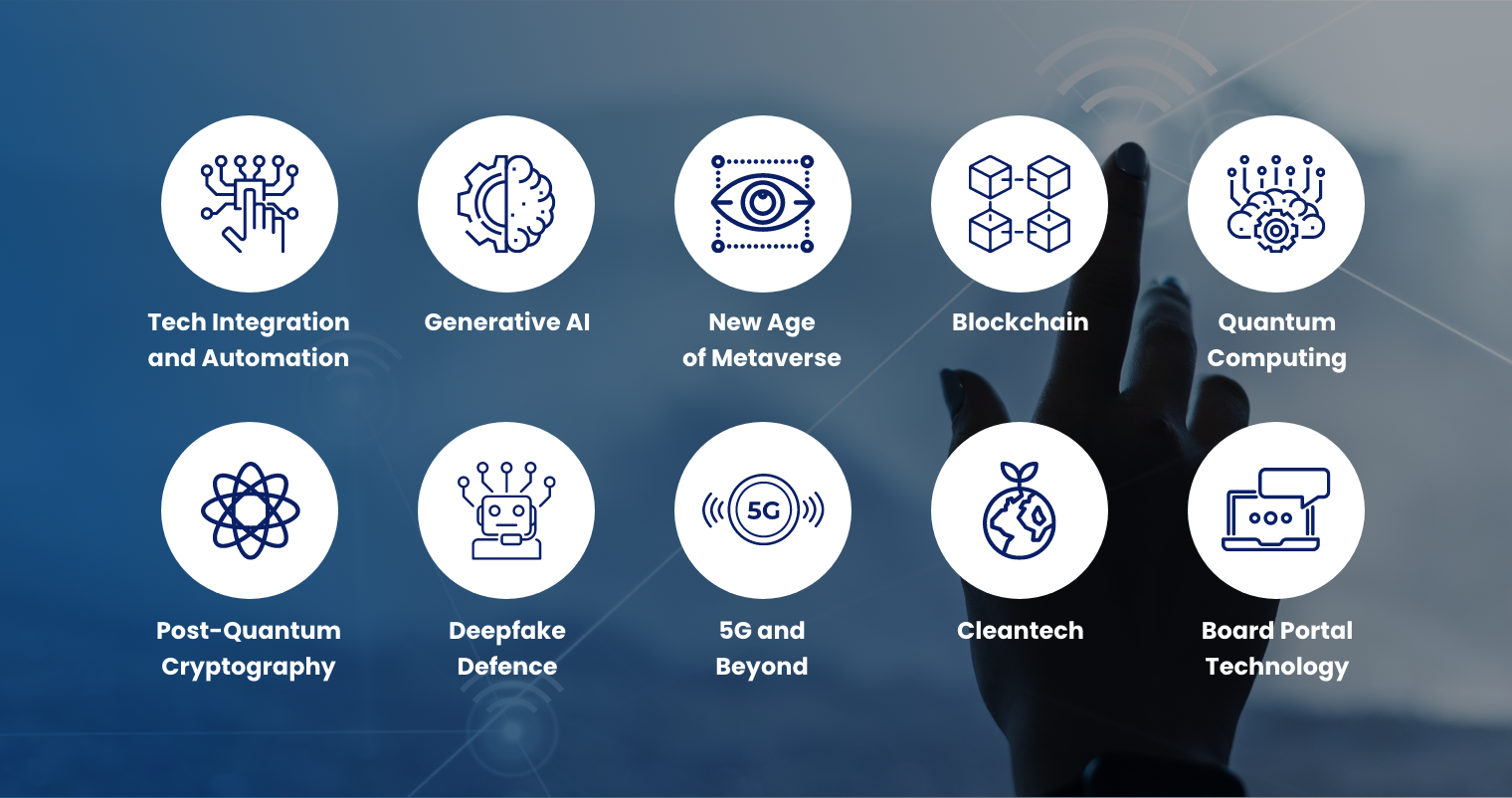The rapid integration of advanced technologies continues to reshape industries all over the globe. As the business landscape approaches a new year, Canadian companies are investing heavily in technological advancements to position themselves at the forefront of the global digital economy.
Below are some technological trends the Canadian business sector is using to foster a tech-forward future — and will continue to in 2025 and beyond.

1. Tech Integration and Automation
In 2023, the Canada Industrial Process Automation Market was valued at $1.21 billion. A recent report suggests that it is expected to reach US$1.88 billion by 2030 at a CAGR of 56% from 2024 to 2030. This growth is due to the increasing demand for the industrial process automation market in Canada — further fueled by advancements in automation and robotics. Hence, demonstrating how Canada is a leader in automation.
Canadian businesses have been utilizing robotic process automation (RPA), AI-powered analytics, and IoT-based systems to streamline labour-intensive tasks. As climate change threatens Canada’s agriculture-technology sector, farms, and food banks are encouraged to invest in automation tools — creating climate-smart agriculture.
Automation usage is expected to grow across major sectors in 2025, as Canadian businesses increasingly require automation tools to refine their operations. The next year also welcomes the emergence of hyperautomation, one of the tech trends that combines AI, machine learning, and process automation. Hyperautomation market in Canada is predicted to reach US$12.5 million in revenue by 2030.
2. Generative AI
At the beginning of 2024, one in seven Canadian businesses was using or planning to use generative AI — a technology designed to produce content including text, audio, and imagery. In fact, Canada has multiple dynamic AI hubs in cities including Montreal, Toronto, Edmonton, and Ottawa.
One key player in this space is Element AI Canada, which launched the generative AI solution ElementCreative in May 2024. The solution is specifically designed to produce personalized marketing content and automate tasks such as social media management and email outreach.
A new report from Microsoft reveals that generative AI could contribute US$180 billion annually to the Canadian economy in labour productivity gains by 2030. Hence, resulting in less time spent on routine tasks with a total time savings of 125 hours every working day. A study by IBM also shows that generative AI fosters new job creation and risk-taking among Canadian CEOs.
In 2025, more Canadian businesses will transition from experimentation to integration of generative AI — as this technology also prompts more workforce changes. The upcoming year is also Canada’s turn for the G7 presidency, leading the international economic forum in AI risk monitoring and AI for climate action. This Canada-led G7 Leaders’ Summit in 2025 could tackle critical issues such as responsible use of AI and risk monitoring, climate commitments to promote clean energy, as well as geopolitical and economic stability concerns (e.g inflation, global security, sustainability).
3. New Age of Metaverse
In 2024, the metaverse has evolved from a novelty into a practical tool for businesses worldwide, including Canadian businesses. Companies use metaverse platforms to provide immersive virtual experiences for customers and employees alike.
Last October, engineers from the University of Waterloo announced that they had developed a cutting-edge system for structural inspection and management called Smart Infrastructure Metaverse. The system utilizes augmented/virtual reality (AR/VR) to make it easier collaboration easier for on-site and off-site inspectors when doing structural inspections.
By 2025, metaverse adoption in Canada is anticipated to mature into a comprehensive tool for different industries. Sectors like education, retail, and healthcare are likely to expand their metaverse use, implementing virtual environments for training, customer engagement, and remote medical consultations. Canada’s metaverse market is projected to reach US$2 million in 2025, and US$11 million in 2030.
4. Blockchain
One of the tech business trends in Canada is Blockchain. Initially developed for Bitcoin, this technology is expanding beyond cryptocurrency — finding applications in industries like supply chain management, finance, and real estate. Canada’s Standing Committee on Industry and Technology stated that blockchain technology is reshaping the country’s digital landscape.
Locally, blockchain technology and cryptocurrencies are governed by provincial securities laws and regulations for transparency. Looking ahead, blockchain applications in the country — and worldwide — are expected to expand into asset tokenization and digital identity verification.
This technology will also play a critical role in healthcare data security, enabling Canadians to have more control over their health records without worrying about data breaches. Real estate and law industries will also likely use blockchain to streamline processes like contract management, ensuring tamper-proof transactions. Research suggests that blockchain technology in Canada is projected to reach $40 billion by 2025.
5. Quantum Computing
2024 proves to be a breakthrough year for advancement in quantum computing research and commercialization in Canada. Earlier this year, the Innovation, Science and Economic Development Canada (ISED) launched the National Quantum Strategy (NQS) to support the country’s quantum innovation. It highlights three missions:
- Make Canada a world leader in the development, deployment, and use of quantum computing,
- Ensure Canadians’ privacy and cybersecurity in a quantum-enabled world through a national secure quantum communications network, and
- Enable the Government of Canada and key industries to be developers and early adopters of new quantum sensing technologies.
The Government of Canada has also allocated US$360 million in funding to further strengthen the country’s quantum ecosystem. In a study by the National Research Council of Canada (NRC), the quantum sector will turn into a US$139 billion industry with 200,000 jobs and US$42 billion in returns by 2045.
Canada-based D-Wave Quantum Inc. recently launched a new commercial hybrid quantum computing system that can solve problems for practical commercial applications. This hybrid model is designed to tackle large-scale research and optimization problems of national laboratories and the research community.
With such a ramp-up in quantum research and funding, Canadian businesses will likely begin piloting early quantum solutions in 2025. Finance and healthcare industries are also anticipated to explore quantum-enhanced algorithms to further data security and achieve higher levels of computation.
6. Post-Quantum Cryptography
With advancements in quantum computing, Canada is solidifying its position at the forefront of post-quantum cryptography (PQC) development. Last August 2024, the Canadian Cyber Security Centre (CCCS) underscored its alignment with the newly released quantum-resistant standards by the National Institute of Standards and Technology (NIST).
Such standards are created to counteract the threat quantum computers pose to current encryption algorithms. The CCCS also initiated a multi-year plan to integrate quantum-safe technologies into government and infrastructure systems, starting in 2024 and beyond.
Earlier this year, the University of Waterloo announced that it had joined the Post-Quantum Cryptography Alliance, an international collaboration involving academia and governments to develop cryptography algorithms (or the PQC). The development and testing of new PQC algorithms—from this year onto the next—that can withstand attacks from quantum computers.
Canada’s active involvement in post-quantum cryptography is part of a broader global effort to prepare for quantum threats. By 2025, Canadian entities will likely accelerate their transition to post-quantum cryptographic systems, emerging as a leader in PQC implementation.
7. Deepfake Defence
Deepfake, a new technology in Canada, uses AI to create hyper-realistic but fake images, videos, and audio recordings — a growing concern for Canadian businesses and political institutions. In a study by EY, 80% of companies report that voice or video deepfakes are real threats to operations and that 90% of online content in 2026 may be authentically generated.
The Canadian Government is implementing measures to curb the malicious use of deepfake technology. These include legislative developments such as the Online Harms Act (Bill C-63) to explicitly address deepfakes and Amendments to the Canada Elections Act (Bill C-65) referring to measures to safeguard election integrity.
In a 2024 survey by KPMG, 95% of Canadian companies reported that the threat of deepfakes has increased the risk of fraud, and 91% are worried that deepfakes will be used to spread corporate misinformation and disinformation campaigns. A study by Dais, a public policy organization at Toronto Metropolitan University, found that 60% of Canadians have encountered deepfakes, with younger people more likely to see them multiple times a week.
Canada’s deepfake defence in 2025 will likely focus on strengthening legislation like criminalizing the creation of harmful deepfakes. Continued efforts on public awareness regarding the risks of deepfakes are also a critical step for the Canadian government and industries.
8. 5G and Beyond
The fifth generation of mobile networks, 5G, has brought faster speeds and greater connectivity to communities. 5G’s low-latency and high-speed connectivity are particularly beneficial for Canada’s remote regions—where it has enabled advancements in telecommunications, healthcare, and consumer engagement.
In early 2024, networking and telecommunications company Ericsson announced the enhancement of its 5G standalone (5G SA) network across Canada. This aims to empower Canadian businesses to take advantage of innovations such as virtual and augmented reality and cloud gaming.
Just early November this year, Ericsson and the Government of Canada announced the signing of an expanded funding agreement for 5G and other technological innovations. This partnership aims to not only provide connectivity to more Canadians but also create high-skilled jobs and advanced technologies for global communications in 2025. The 5G services market in Canada is forecasted to reach US$46.3 million in revenue by 2030.
9. Cleantech
Driven by the global demand for sustainable solutions, Canada’s cleantech industry is rapidly expanding. At the start of 2024, Canada ranked second on the 2024 Global Cleantech Innovation Index (GCII), providing the country’s global leadership in clean technology.
The country also offers access to financial incentives to businesses investing in cleantech. For instance, Canada’s Clean Energy Incentive Program announced in the 2024 Federal Budget that they will provide substantial savings on cleantech investments on top of major cleantech tax credits.
Recently, the Government of Canada also showed its support for cleantech manufacturers by investing in clean energy innovations for the country’s transition to a cleaner economy. In addition, the federal government announced its plan to create Made-in-Canada sustainable investment guidelines to accelerate private capital flow into sustainable activities across the country’s economy. The government said they will give an update by the end of 2024 on the development of these guidelines — which will likely start implementation next year.
By 2025, Canada is set to solidify its position as a global leader in clean technology, with investments in green infrastructure and energy-efficient manufacturing expected to grow.
10. Board Portal Technology
The adoption of board portals has seen substantial growth in 2024 globally. In Canada, both corporations and nonprofits have embraced such platforms to maintain operational transparency, compliance, and responsiveness in board activities. Board portals like Convene provide a centralized environment for boards to collaborate, share documents, track progress, and even vote.
Such platforms are also particularly valuable in Canada’s financial sector, where boards frequently deal with confidential information. Their built-in security features, such as two-factor authentication and encrypted document sharing, address concerns around data privacy and cybersecurity.
As governance standards evolve, Canadian companies are likely to prioritize board portals as a critical tool in 2025. The use of these tools is also projected to become nearly universal for large and mid-sized organizations.
Convene: Leading the Way in Canada’s Tech-Driven Governance for 2025

Purpose-built for modern Canadian boardrooms, Convene brings together advanced technology and unmatched security to keep pace with governance challenges. For Canadian businesses striving to stay at the forefront of innovation, Convene is more than a tool—it’s a strategic advantage.
Our platform is equipped with live voting, resolution tracking, and built-in video conferencing for real-time collaboration. In its latest version, Convene offers a secure, end-to-end document review and approval with integrated digital signature solutions, such as Adobe Sign, DocuSign, eSignabox, and Sayen. For document collaboration, Convene Live Edit allows users to edit documents in the app via Office for web integration—with changes reflected in real-time.
Trusted by Canadian and US organizations for its reliability, Convene has become a preferred solution for secure, efficient board management. Here’s what some of our clients have to say about Convene:
“We chose Convene for its smart features for meeting preparation and document management. We don’t know what we would do without Convene anymore.”
— Bank Forward“Before Convene came into play, it would take a day or two to compile all the files and prepare them for presentation. Convene is the present and the future of the organization.”
— Omaha Bar Association
Learn more about Convene’s features and how they align with Canada’s tech-forward goals. Request a demo today.
Jielynne is a Content Marketing Writer at Convene. With over six years of professional writing experience, she has worked with several SEO and digital marketing agencies, both local and international. She strives in crafting clear marketing copies and creative content for various platforms of Convene, such as the website and social media. Jielynne displays a decided lack of knowledge about football and calculus, but proudly aces in literary arts and corporate governance.







